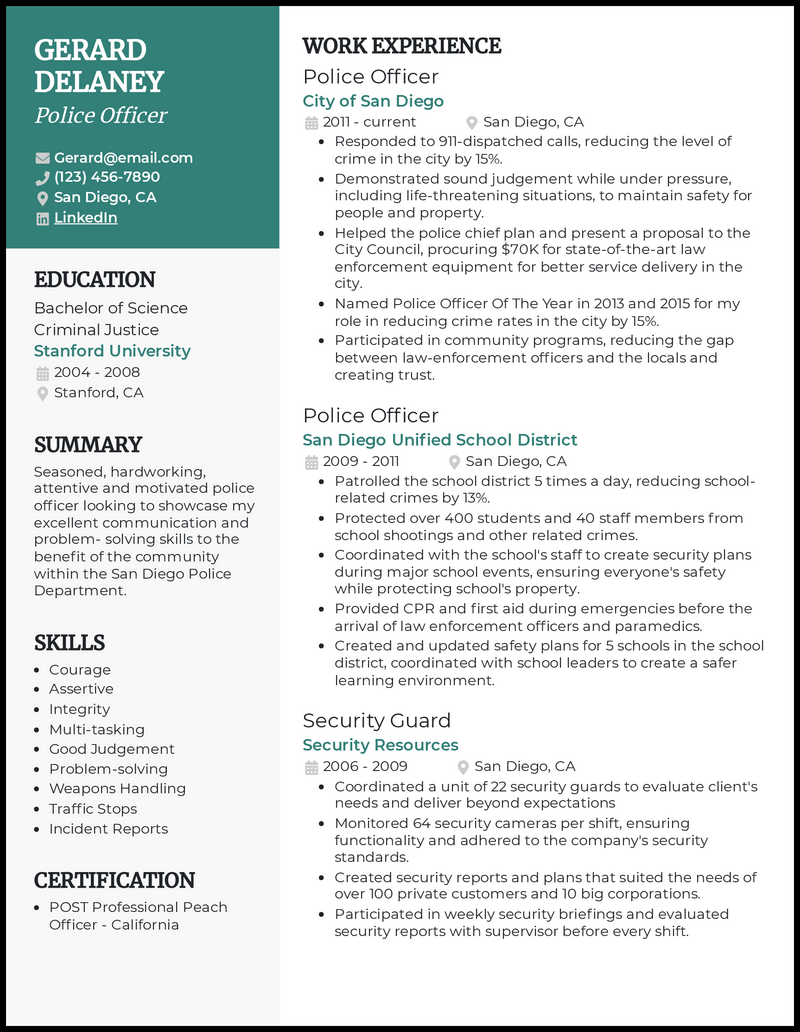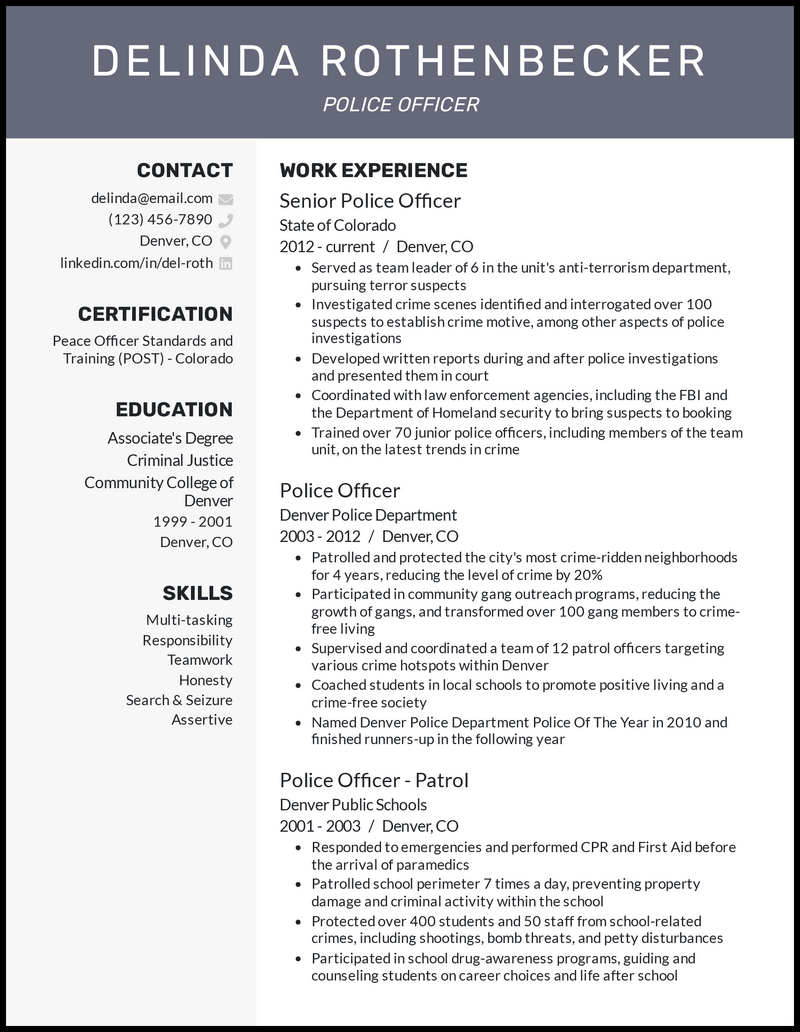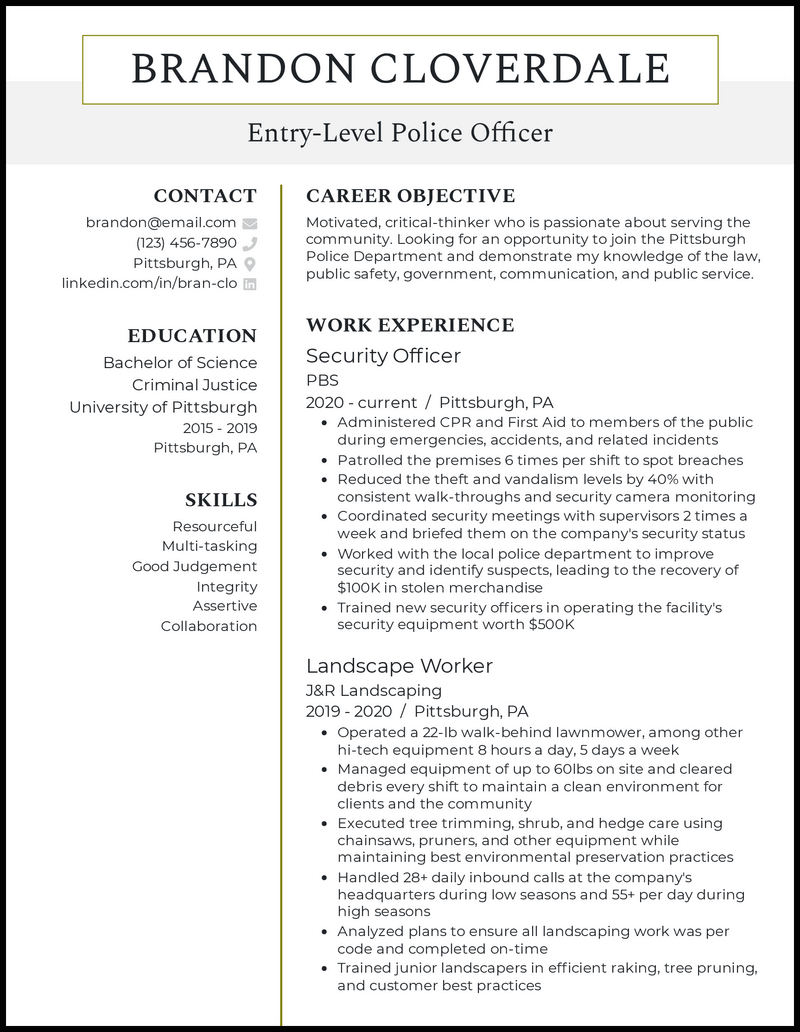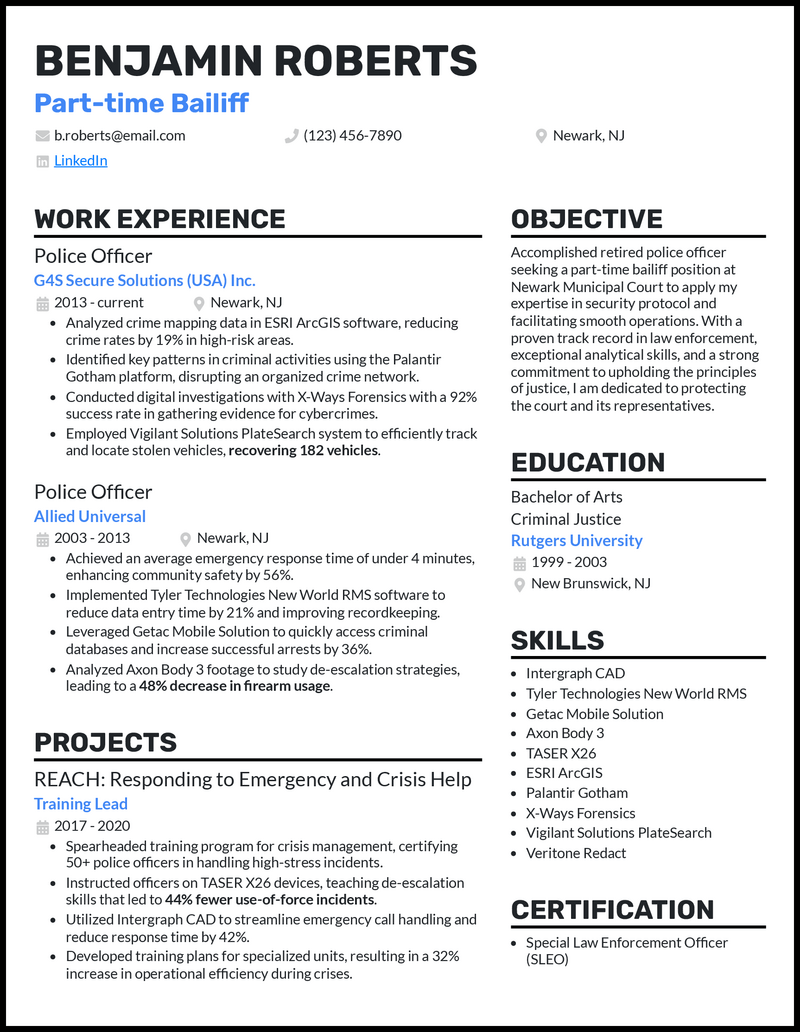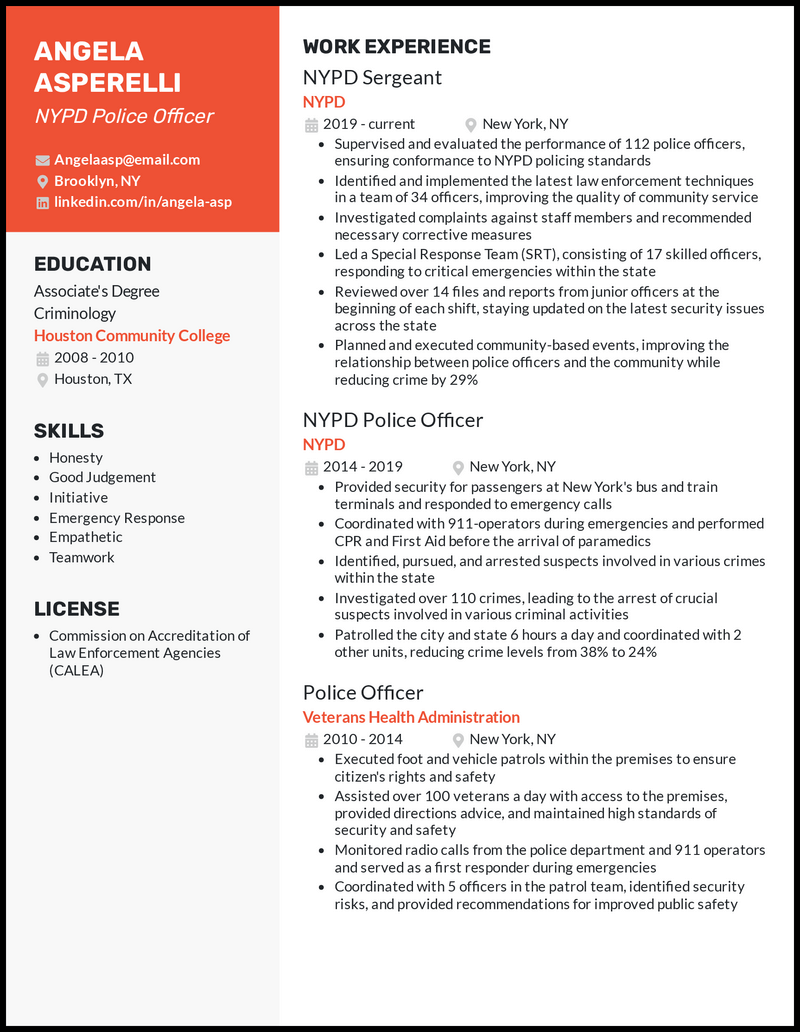You’re a defender of the police and a protector of the innocent; you’re a police officer, and keeping people safe is what you do.
As a police officer, you’re used to discipline and organization, so your resume should also reflect those qualities. But what else does a good resume include? Making an amazing resume and writing an effective cover letter may feel more exhausting than chasing a suspect through the night, but it doesn’t have to be mysterious.
For this reason, we’ve created 13 police officer resume samples that will help get you hired in 2025. These resumes contain everything you need to know about writing a police officer resume, including the essential details you’ll want to include or omit so that you can turn in your current job resignation letter and get hired faster!
Why this resume works
- While many people may recommend adding a summary or objective, you should only include a resume summary if you’ve been in the field for at least 10 years. If you’re just starting out, you can use a resume objective instead.
- If you’re in the middle of your career, don’t worry about adding an objective or summary to your police officer resume; they’re completely optional, albeit useful if used well.
- On the flip side, if you do choose to use an objective or summary, always tailor it to each job for which you apply. Mention the employer and role by name and include your reasons for wanting that particular position.
- Mentioning achievements such as winning the Police of The Year Award will capture the attention of hiring managers, which is the whole goal of writing a resume.
- Hiring managers typically spend only six seconds reviewing your resume. Including awards can help you gain recognition and increase your chances of getting an interview.
Why this resume works
- Demonstrate your capabilities in the field using numbers to quantify achievements and explain your impact throughout your career.
- “Supervised and coordinated a team of 12 patrol officers” and “reducing road accidents in school zones by 50%” are potential examples of tangible, eye-catching results.
- Wondering which skills to include in your experienced police officer resume? There’s a myriad of skills you can include in your resume’s skills section, but make sure not to go overboard.
- We’d recommend listing six to eight highly relevant skills such as “search & seizure” and “teamwork.”
Why this resume works
- Since you’re just starting your career in law enforcement, you probably don’t have much experience to include on your entry-level police officer resume. Rather than adding useless fluff, get creative by adding a resume objective.
- The key to a good objective is customizing it for each job for which you apply. Include the name of the employer, the role you’re seeking, and the skills you hope to use in your future position to stand out and get noticed by hiring personnel.
- If you’re low on law enforcement experience, simply include any work experience you have. Then in your work experience bullets, focus on highlighting transferable skills related to the police officer job description.
- For example, mentioning soft skills like “managed,” “handled,” “analyzed,” or “trained” shows leadership and is a great way to book your spot for an interview!
Why this resume works
- Despite being wet behind the ears, make sure to create a good first impression. You don’t want the potential employer thinking they’ve got to teach you everything. So? Ensure that your police officer trainee resume is nothing short of dazzling.
- Your resume format must be spot on. Give thought to using a two-column layout and a simple (and legible) font like Calibri or Times New Roman. Noticed how Mira uses a dash of color to accentuate her former places of work, high school, and job title? Follow her lead.
Why this resume works
- It may be challenging to summarize your storied law enforcement career on your retired police officer resume, but including a career objective can help align your background with your desired role.
- For a part-time bailiff position, shape your career objective around your proven ability to follow protocol—a must in courtroom settings.
Why this resume works
- Attention! James’s police chief resume is here to teach you how to make your resume stand out from the rest.
- The first order of business is to have proper sections for your personal details, education, and skills. Next, don’t forget to add certifications such as Virginia Law Enforcement Certification to display your expertise. During the final round, highlight your most proud accomplishments before hitting send.
Why this resume works
- Using impactful action words can do wonders for your police sergeant resume. Take a look at how words such as tracked, developed, and supervised convey the candidate’s strength more confidently.
- Topping it off with a section to show skills in Zetron MaxCAD or Vigilant Solutions ALPR will demonstrate your technical experience extensively. Oh, and don’t shy away from adding in any relevant certifications too.
Why this resume works
- A military police officer resume that shows you can keep the upper hand while in the field can give you a leg up in the competition. And what better way to write it than by showcasing your leadership prowess?
- For instance, don’t shy away from bragging about the moment you led security operations for 53 VIP transports, capitalizing on industry-relevant software like Guardium to monitor sensitive data access and prevent unauthorized intrusions.
Why this resume works
- An essential attribute in any candidate seeking a police support role is a passion for public safety. Presenting a long history of commitment to law and order will strengthen your auxiliary police officer resume.
- Don’t forget to include your criminal justice degree on this resume. It reveals a longstanding dedication to the mission of the police department.
Why this resume works
- Your NYPD police officer resume needs to have modern, formatting should state your most current experience first.
- For instance, did you achieve the status of sergeant or captain? Include it on your resume, highlighting your most recent and relevant experience first in reverse-chronological order.
- Another pro tip when building a resume is to always maintain an active voice to demonstrate ownership.
- What does this mean? Use strong verbs and active voice to demonstrate your leadership. For example, instead of saying, “Aided other officers in patrols by taking calls,” say “Monitored radio calls during night shift to assist officers during patrols.”
Why this resume works
- Make your federal police officer resume sparkle with a neat and elegant resume format.
- Start by putting your work experience in reverse-chronological order, then lay out the rest of your information according to importance.
- For example, keep your contact header at the very top of your resume, and put your skills section after your education.
- Law enforcement officers need to be attentive to small details, so focusing on specifics like consistent punctuation will help you get hired.
- You’d be surprised to discover the fine details interviewers notice when searching for the perfect candidate, so always check your resume for errors before you hit submit!
Why this resume works
- You should show how you’ve taken on greater responsibilities if you have multiple sections of work experience in your public safety officer resume. Applying this resume tip will help the employer get a sense of what you’ve accomplished in your career.
- For instance, have you moved from completing some tasks to supervising various teams completing many tasks? Ensure your resume shows a progression in your ability to handle more responsibilities.
- Want to know how to use appropriate resume skills in the body of your resume? Dedicate one or more bullet points in your work experience to a specific skill (ideally tied to a metric).
- The goal with your skills should be to show employers you’ve got more than just head knowledge. A great example would be “administered first aid to 32 injured students” because it shows how you applied your abilities at first aid.
Why this resume works
- If you’re describing your work experience without relating it to the role you’re applying to, that’s a no-no for most employers. The entire point of writing a resume is to show how you’re qualified for the job.
- Make the job description your roadmap for skills and experience to include. Are they looking for someone to train new recruits? Mention how you mentored cadets in the past. Do they want someone who can maintain their own police vehicle? Include any maintenance experience you have. Customizing your resume is the number one way to get noticed!
- On the note of customization, avoid mentioning irrelevant skills in your campus police officer resume, especially if you choose to use a resume summary.
- Your employer likely expects you to have experience dealing with adolescents or college students, so, try to mention your communication skills. This kind of resume alteration will help employers realize you’re the one.
Related resume guides
Police Officer Resume FAQs

What employers don’t want to see is a list of job duties. They already know what a police officer does; instead, use your job description bullet points to speak to accomplishments in your law enforcement career. What situations did you encounter, how did you respond to those situations, and what was the result or impact? Whenever possible, quantify those statements.
Be detailed and specific in your resume, but save the story-telling aspect for your police officer cover letter.
This depends on the job description. If you’re applying to work as a public safety officer, you might consider skills like firearm safety and security equipment maintenance. If you’re planning to serve at a college campus, crowd control is an excellent skill to have. And working for a traditional police department, search and seizure will be important. The point is to understand what the job requires and to tailor your police resume accordingly.
Since law enforcement leaves room for an upward trajectory, it makes the most sense to format your resume in reverse-chronological order. What’s “above the fold” of your resume is what hiring teams will focus their attention on most, which means if you’re currently a sergeant, you shouldn’t start by listing your first job right out of the police academy.




